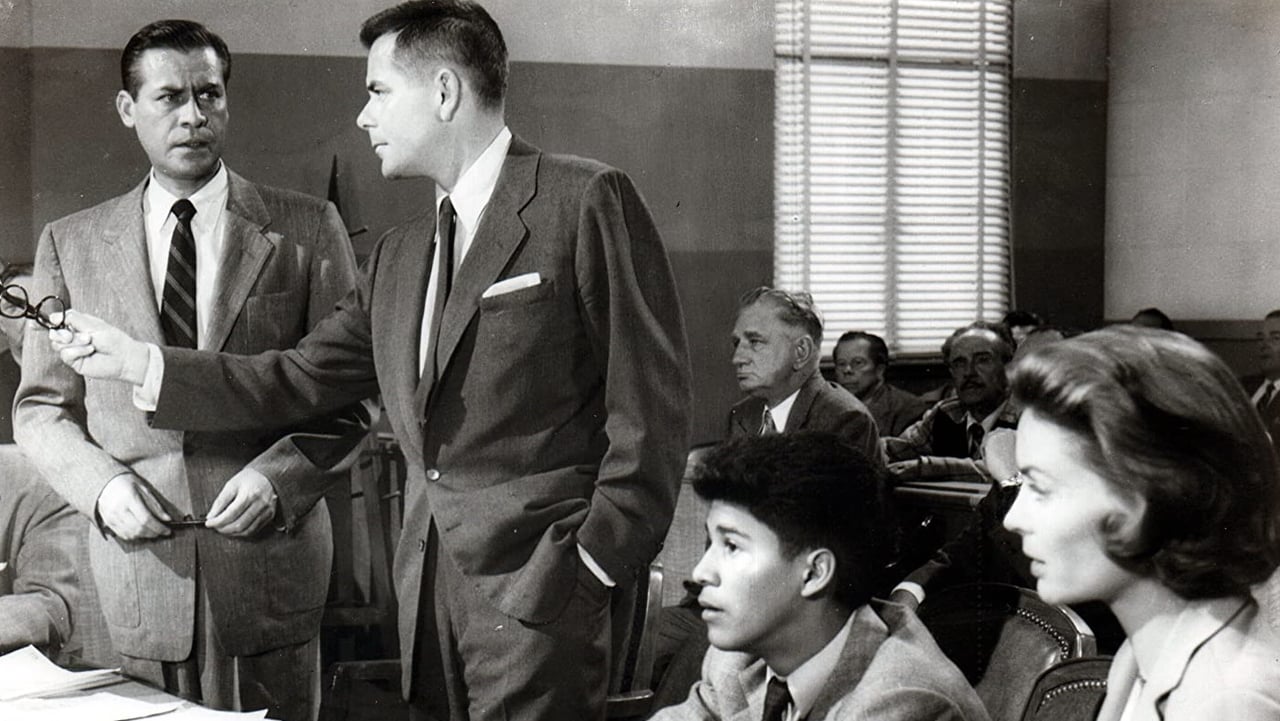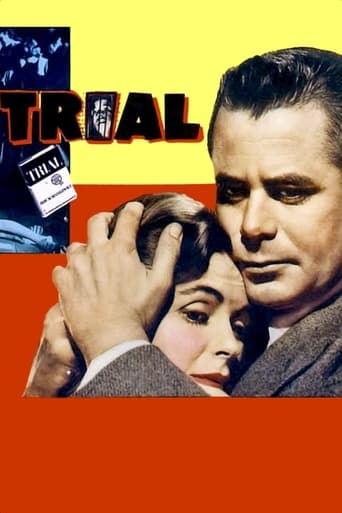Exoticalot
People are voting emotionally.
Manthast
Absolutely amazing
Patience Watson
One of those movie experiences that is so good it makes you realize you've been grading everything else on a curve.
Lachlan Coulson
This is a gorgeous movie made by a gorgeous spirit.
dougdoepke
A self-doubting law professor wants to prove himself by defending a Mexican boy accused of murder. In the process, however, he gets mixed up with powerful political forces seeking to use him and the trial for their own narrow purposes.As I recall, the movie got a spread in Life magazine, probably because of its topical theme and serious intent. In the mid-1950's, race was becoming a major political topic, 1954's de-segregation ruling being a chief catalyst. Clearly, the movie wants to frame the emerging issue in generally liberal terms, vilifying both bigots and McCarthyites on the political right and communists on the left. In contrast, Glenn Ford's idealistic attorney stands in for what the movie hopes will be an emerging consensus, one that endorses a principled justice for all races. Making the judge (Hernandez) a Black man also suggests that our institutions can work well regardless of skin color.Now these are worthy topics, but even the best screenplay would have difficulty blending them into an effective 100-minutes. Unfortunately the result here tries to cover too much and ends in little more than an awkward dramatic mix. Also, the usually low-key Ford is too low-key in the movie's pivotal role. Thus the many disparate elements lack a unifying center, drifting more or less from one thread to the next without needed coherence. Notably, however, the film manages to avoid the cartoonish communist stereotypes of the period, making that key Cold War element more believable than most. For example, Kennedy's attorney (Barney) may be a schemer but he's also recognizably human, along with his boisterous fund- raising crowd. And when he admonishes the crowd to not trust anyone, I had to re-run to make sure I'd heard the un-Stalinist sentiment correctly. All in all, it's a well-intentioned film, but lacks the dramatic impact, for example, of the similarly themed 12 Angry Men (1957). Moreover, the sprawl is simply too loose to provide an effective "think piece" platform.
edwagreen
Very good film showing how the Communist Party in the United States tried to exploit a case of where a young Mexican boy was accused of killing an American girl. It's all for the cause, even if it means that the Mexican, is put to death.What a year 1955 was for Glenn Ford. Besides this film, he made "Blackboard Jungle," and the equally wonderful "Interrupted Melody."Arthur Kennedy gained still another Oscar nomination, but always in a losing effort, as the lawyer who takes him in to defend the case, while Kennedy has an entirely different agenda.Dorothy McGuire, Kennedy's aide, falls for Ford and later informs him of her unwillingness to accept the party line.Just like "The Manchurian Candidate," this is a frightening film of subversion in the good old U.S.A. Of course, Katie Jurado is the mother of the accused and she rattles off that same emotion as she did a year earlier in her Oscar nominated "Broken Lance."
dpingr1
This very unsatisfying movie is really all over the place, just like the era that produced it. In that sense, it's an interesting document of its time, but not too fun to watch. It starts out as a typical corporate-liberal morality courtroom-crime movie, a' la Call Northside 777 or 12 Angry Men. But those movies were unequivocal about their direction -- they knew where they wanted to go and went right there. This one quickly loses its thread as it veers off course into 1950s anti-Communist paranoia-land. This movie isn't satisfied pointing out the dangers of the Communist 5th column that supposedly wanted to tear down our society and values. It doesn't even have faith in its own anti-Communism, posing the idea that 1950s ultra-leftism was bad because it was some kind moneymaking con. The plot about the far right ideologues who want to lynch the boy at the film's outset is forgotten about a third of the way through. The usually terrific Glenn Ford looks lost here -- his notion of moral confusion seems to be wandering around as if he has forgotten his lines. Maybe he's trying to figure out where the plot will go next? The film's final bizarre resolution is unrealistic, to say the least. We're supposed to be happy that the Mexican boy is only sentenced to a juvenile reform school instead of the electric chair. But the problem is -- is the boy a murderer or isn't he? If he's not (as the film seems to imply), why is it fair that he is punished at all? This is the American consensus view at its most confused. The final scene where the prosecutor stands up and agrees with the lenient sentence is the prize topper to this unlikely and directionless trial. This isn't the most far-fetched law movie -- I can't decide whether that honor belongs to the stupid "Suspect" starring Cher or the well-made "Boomerang!" with Dana Andrews. But it's certainly the most confusing -- guaranteed to appeal to the modern nativist right wing, who will probably think it's okay that a Mexican boy be sent to reform school for daring to set foot on an all-white beach or sit next to a white girl. (That'll teach 'em.) I should also mention the headache-inducing "edgy" bebop piano score, which seems to have been a staple of this type of movie in the 50s. It does have a few laughs, though these are unintentional. For example, listen to Dorothy McGuire's little soliloquy about how she turned Communist sympathizer during college -- she just wanted to be special! Weird, weird weird.
aeontwo
This film fascinates precisely BECAUSE of its confused treatment of the theme of bigotry. It does not only refer, under a thin disguise of name, to Senator McCarthy - but also to the Ku Klux Klan. To me, its chief value is that it illustrates rather startlingly the ethical strangeness of a mid-fifties America apparently seeking a definition of justice while still beset with considerable self-doubt concerning its own institutions.Few films of the period make so explicit the names of the antagonists; that is what sets it apart.On the level of pure melodrama, it is entertaining, fast-paced and convincingly acted. The opening scene suggests an erotically-charged no man's land, namely the beach community of San Juno, anno 1947. This is the scene that I think will remain in my memory, because it precedes all the rhetoric, legalistic and otherwise, which never quite connects with the reality of spontaneous behaviour - simply, groping in the dark.

